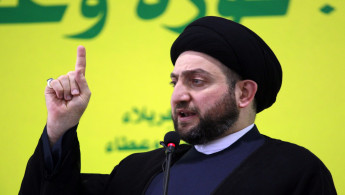Sunni and Shia fight IS together, says Iraq cleric
In a meeting with the Iraqi community in Jordan at the Iraqi embassy in Amman, where he is visiting at the invitation of King Abdullah II, Hakim said that "the Sunnis and Shia are today fighting IS side-by-side with each other, under one command, and based on one plan."
He rejected accusations levelled against the paramilitary Popular Mobilisation forces, without naming them. He said it was a military force, operating with state-controlled weapons and under state sponsorship - and could not be described as "outlawed militias".
Hakim, however, admitted that errors had been made, saying that "there are mistakes in any war; no one denies that there are mistakes, but we stand firmly against attempts to show that these are systematic mistakes meant to offend a certain segment, a certain region or the like".
| Partitioning Iraq is not a solution... whoever separates from a united Iraq... exposes themselves to a tsunami of grave danger. - Ammar al-Hakim. |
Hakim also called on the international community to work together to eliminate the IS group, warning "it is not only a threat to the Iraqis, but also a threat to the entire region and the world".
"The presence of fighters from 80 countries, including indigenous citizens of Western countries, who joined the IS and received training on manufacturing home-made weapons, combat operations, and autonomous management of battles can create a Charlie Hebdo in any region of the world."
Hakim touched upon the role Iran, China, and Russia are playing in supporting Iraq against the IS group, although these countries are not directly involved in the 63-state coalition. He said that this indicated the presence of an international mobilisation in favour of Iraq.
"There will be no negotiations with the IS," Hakim said.
Eliminating the organisation, he said, required a four-pronged strategy:
- A military drive, based on hunting down the organisation to drive it from Iraqi territory and drying up its sources of funding.
- A political campaign based on enhancing national reconciliation as a genuine programme, not mere sloganeering.
- Social development work to bridge the sectarian and ethnic rift "to open a new chapter of co-existence".
- Industrial development, based on efforts to rebuild the destroyed regions.
Hakim also railed against the idea of dividing Iraq.
"Partitioning Iraq is not a solution... whoever separates from a united Iraq - be they Sunni, Shia or Kurds - exposes themselves to a tsunami of grave danger."
This is an edited translation from our Arabic edition.



